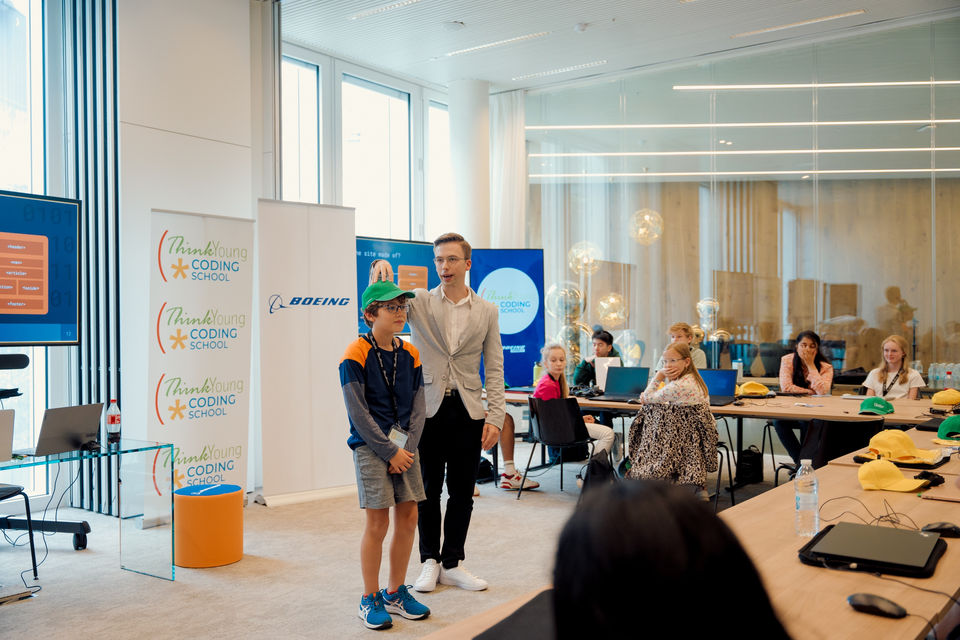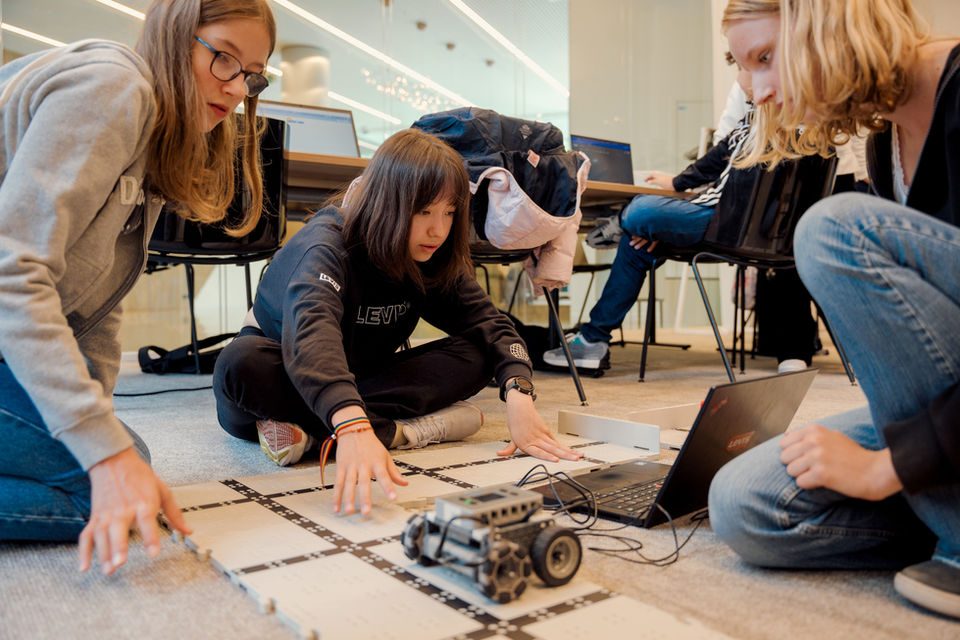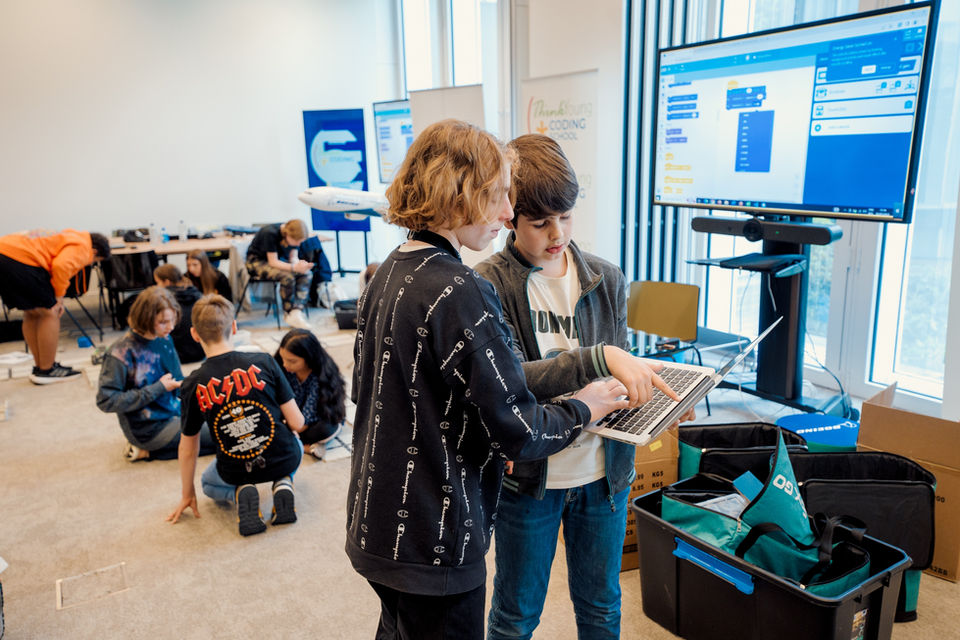
ABOUT
The ThinkYoung Coding School provides young people with a unique opportunity to build their STEM skills through practical workshops and engaging learning experiences. In a dynamic, non-formal educational setting, students engage with teachers, experts, professionals and their peers to learn more about science, technology, engineering, and mathematics in ways that bridge the gap between today's youth interests and industry demands.
The ThinkYoung Coding School started in Brussels in the summer of 2016.
Youth unemployment was at a record high but there were 1 million vacant jobs in the European IT industry due to lack of skills, creating a declining competitiveness within the European market.
That is why ThinkYoung and Boeing decided to take action starting the first edition of the ThinkYoung Coding School.
Education throughout Europe was struggling to adapt and address the needs of the future job market. The skills being taught in schools were not preparing or addressing the real needs of both the youth and the skills required by industry. Young Europeans learned the basics of IT first hand outside of schools, but the modern economy demands youth learn a deeper and more sophisticated use of technology and use of STEM skills.
Policy makers in Europe were, and still are, facing the challenge of providing the young generation with the tools to become future-proof and prosper in knowledge-based societies. Knowledge-based societies, on the other hand, require individuals to act upon their knowledge to produce new things, to know when and how to learn as well as how to learn with others. Currently, education systems across the EU are falling short in responding to this challenge.
The 2014 Skills Mismatch report by ThinkYoung shows a significant gender gap in coding skills. Female students and graduates report significantly lower levels of coding ability than their male counterparts (p.31). While girls do well in using computer software such as word processing, presentation software and social media, they lack significant digital competences such as coding, spread sheet, database language and web development skills (ibid, p.33). In no other STEM subject is the gender gap larger than in the ICT sector. Young women do not choose topics related to ICT and the number of women choosing an ICT career is even lower. “Of 1000 women with a Bachelors or other first degree, only 29 hold a degree in Information and Communication Technologies (ICT) compared to 95/1000 men (European Commission 2013).
In 2014, Google published employment statistics detailing that only 30% of their employees are women. This percentage is equal to statistics published by the European Commission, stating that only 30% of about 7 million people working in the ICT sector are women (European Commission, 2016). Not only are women under-represented at all levels of the ICT sector, their number is particularly low in managerial and decision-making positions. According to a study on women active in the ICT sector by the European Commission from 2013; women entering the digital job market can create an annual €9 billion GDP boost in the EU (European Commission, 2013). In response to their low number of female employees, Google published a study in 2014 to identify the driving factors to trigger female interest in ICT studies. According to their study, women need social encouragement, self-perception, academic exposure and career perceptions. All of these factors are focused on overcoming the stigma of “geeks” and “nerds” as well as the male domination in the ICT sector by empowering women to choose a path in ICT by giving them female role models, early experiences of computer science, encouragement in solving puzzles and problems in order to foster logical thinking, and finally in building a supportive environment capable of instilling confidence and interest.
Findings from the ThinkYoung Coding School 2016 , run by ThinkYoung and Boeing, highlighted that 72% voted 5 when asked how likely they were to study STEM in higher education. 66% of the students from the 2016 school were between the ages of 15-17 and were influenced to study STEM going forward. In 2017, 64% of the students rated themselves as basic coders and by the end of the school 76% of them stated that they were likely to study STEM subjects at a higher level. This edition was actively engaging with 114,257 people online.
In 2018 the fourth edition of the ThinkYoung Coding School took place in the Netherlands and hosted at the Boeing offices in Amsterdam.
In 2019 the sixth edition of the ThinkYoung Coding School took place in Belgium and hosted at The Space in Brussels. The seventh edition of the ThinkYoung Coding School took place in Nairobi in October, marking the opening of ThinkYoung's new office in Africa.
Since 2020, the classes have taken place annually in Brussels and across Africa. Young students from Europe, Kenya, Rwanda, Ethiopia, Tanzania, and Nigeria have participated in sessions hosted in their respective countries.
In 2022, following the full-scale Russian invasion of Ukraine, a special edition of the ThinkYoung Coding School was held in Gdańsk, Poland. We welcomed young temporarily displaced Ukrainians alongside Polish students. In addition to coding, the curriculum included classes on emotional intelligence. The school was a major success, hosting over 200 young participants.
In 2024, the ThinkYoung Coding School ventured into the Caspian region for the first time. A five-day bootcamp took place in Baku, Azerbaijan, where 55 young Azerbaijani students learned the fundamentals of coding—60% of them were girls.
In 2025, the 25th edition of the ThinkYoung Coding School will return to Brussels.
Over the past 24 editions, we have trained more than 1,400 teenagers in coding and programming—and counting.
Watch all our best-of videos and after movies HERE.





